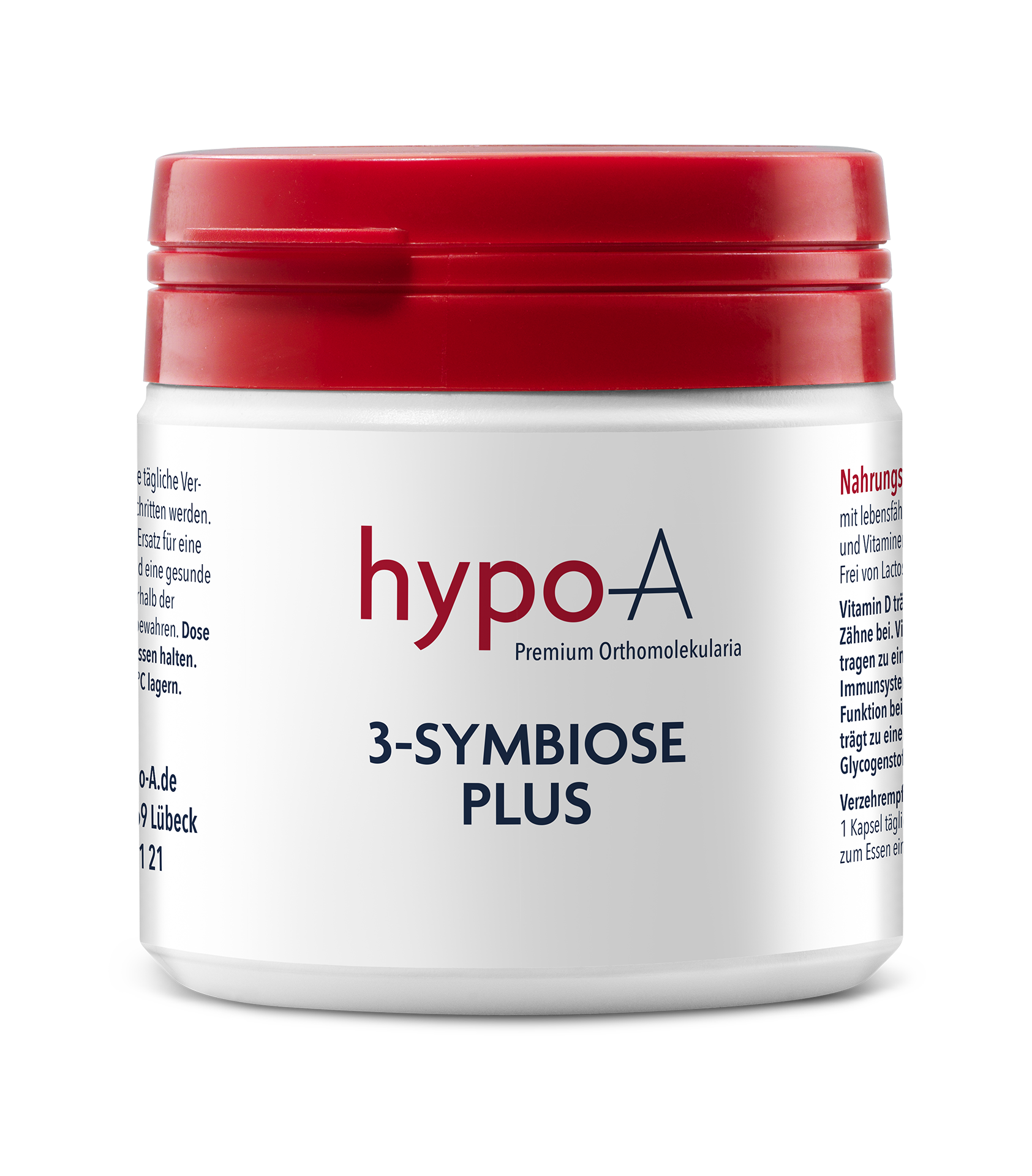3-Symbiose plus | 100 Capsules
54,50 €
Available, delivery time: 1-3 days
Approximately 100 trillion bacteria live in our intestines - significantly more than our body has its own cells. 3-Symbiose plus combines three viable cultures: the two lactic acid bacteria Bifidobacterium lactis and Lactobacillus acidophilus as well as Enterococcus faecalis, a typical inhabitant of the large intestine.
Each capsule of 3-Symbiose plus contains one billion of these gut-active symbionts - supplemented with folic acid, vitamins B5, B6, B12 and D. All this makes 3-Symbiose plus a unique nutrient-symbiont combination from which our intestines benefit in many ways.
All five vitamins contained in 3-Symbiose plus contribute to the metabolism, which is one of the central tasks of our intestines. Vitamin D3 (cholecalciferol) supports the muscles that propel our intestinal contents in undulating movements and, together with folic acid and vitamin B12, it contributes to normal cell division - including in the intestinal mucosa. In addition, folic acid, vitamin B6, B12, and D are important immune nutrients for our intestines. After all, it harbours 70 to 80 % of all antibody-producing immune cells!
There is hardly any other area of our health that has been researched as intensively in recent years as the gut. Ever since "Gut with Charme" conquered the bestseller lists and made the inner workings of our intestines socially acceptable, many people have become aware of how significant the microbial balance in the intestines is for our health and well-being.
Our gut inhabitants are not only crucial for good digestion, but are also closely connected to our immune system, our nerves and - via the gut-brain axis - to our mental wellbeing.
Incidentally, 3-Symbiose plus is best taken directly with a meal - also in combination with hypo-A Enzyme. In addition, it has proved particularly effective as a component of ODS 2 as part of orthomolecular intestinal care according to P.-H Volkmann.
| Glutenfrei: | glutenfrei |
|---|---|
| Health topics: | Allgemeine Körperfunktionen, Stoffwechsel, Zellstoffwechsel , Bewegungsapparat: Knochen, Knorpel , Bewegungsapparat: Muskeln, Bindegewebe , Energie, Vitalität , Gehirn, Nerven, Psyche , Herz, Gefäße , Hormonregulation , Immunsystem, Antioxidantien , Kinderwunsch, Schwangerschaft, Stillzeit , Osteoporose , Zähne, Zahnfleisch |
| Ingredients: | Bifidobacterium animalis ssp. lactis (Bifidobacterium lactis) , Cyanocobalamin / Vitamin B12 , Enterococcus faecalis (Streptococcus faecalis) , Folsäure / Vitamin B9 , Kieselerde , Lactobacillus acidophilus , Pantothensäure / Vitamin B5 , Pyridoxin / Vitamin B6 , Saccharomyces cerevisiae (Hefe, inaktiv) , Vitamin D3 / Cholecalciferol , hypoallergene vegane Kapsel |
| Intolerances / eating habits: | gluten free , lactosefree |
| Lactosefrei: | lactosefrei |
Cholecalciferol (vitamin D)
Vitamin D contributes to
- normal function of the immune system,
- normal absorption/utilisation of calcium and phosphorus,
- normal blood calcium levels.
Vitamin D contributes to the maintenance of
- normal bones,
- normal muscle function,
- normal teeth.
Vitamin D has a role in the process of cell division.
Pantothenic acid (vitamin B5)
Vitamin B5 contributes to
- normal energy-yielding metabolism,
- normal synthesis and metabolism of steroid hormones, vitamin D and some neurotransmitters,
- normal mental performance.
Vitamin B5 contributes to the reduction of tiredness and fatigue.
Pyridoxine (vitamin B6)
Vitamin B6 contributes to
- normal cysteine synthesis,
- normal energy-yielding metabolism,
- normal function of the nervous system,
- normal homocysteine metabolism,
- normal protein and glycogen metabolism,
- normal red blood cell formation,
- normal psychological function.
Vitamin B6 contributes to the
- reduction of tiredness and fatigue,
- normal function of the immune system,
- regulation of hormonal activity.
Folic acid (folate/ vitamin B9)
Vitamin B9 contributes to
- normal blood formation,
- normal psychological function,
- normal amino acid synthesis,
- normal homocysteine metabolism.
Vitamin B9 contributes to the
- normal function of the immune system,
- reduction of tiredness and fatigue.
Vitamin B9 contributes to maternal tissue growth during pregnancy.
Vitamin B9 has a role in the process of cell division.
Cyanocobalamin (vitamin B12)
Vitamin B12 contributes to
- normal energy-yielding metabolism,
- normal function of the nervous system,
- normal homocysteine metabolism,
- normal function of the immune system.
Vitamin B12 contributes to
- psychological function,
- normal red blood cell formation,
- reduction of tiredness and fatigue.
Vitamin B12 has a role in the process of cell division.



































